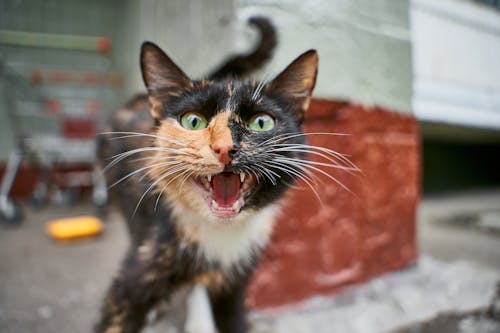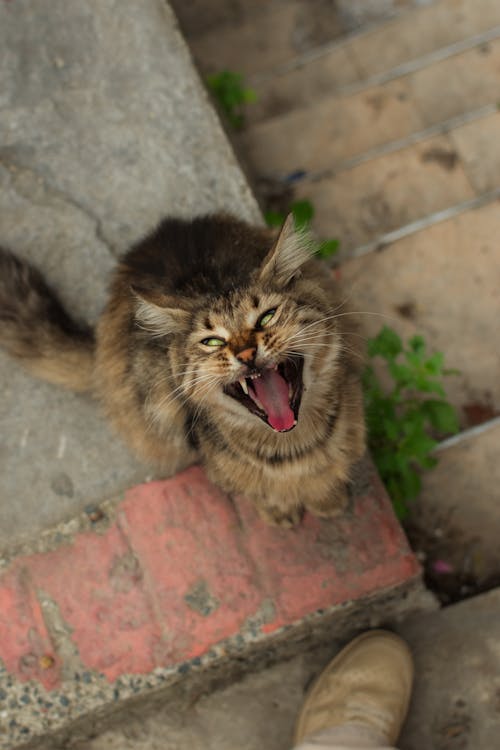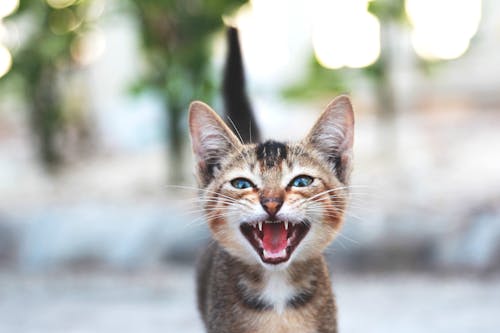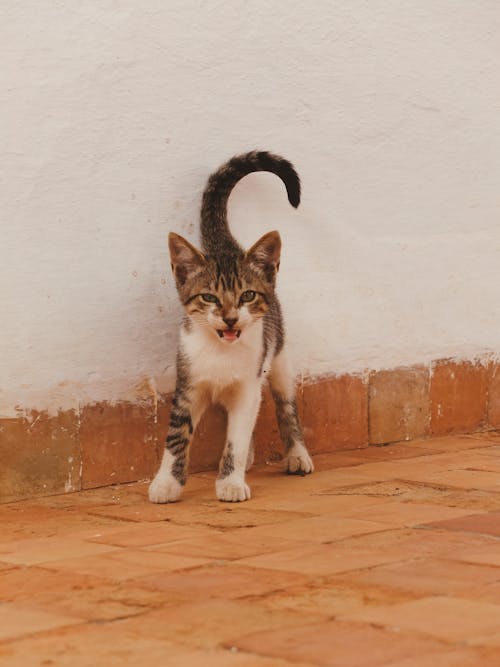Cats are creatures of habit and instinct, and one of the most common issues cat owners face is the dreaded nighttime yowling. Whether your feline friend is keeping you up with their cries or you're simply looking for ways to create a more peaceful home environment, understanding the root causes of this behavior is crucial. Cats meow for a variety of reasons, especially at night when their natural instincts take over. Fortunately, there are several ways to address and mitigate this behavior, ensuring a restful night for both you and your pet.

One of the first things to recognize is that cats are naturally crepuscular animals, meaning they are most active during the twilight hours of dawn and dusk. Historically, these were the best times for hunting in the wild. Even domesticated cats retain some of this instinctual behavior, which explains why they tend to become more vocal or active in the late evening and early morning. If your cat is yowling during the night, it could simply be their internal clock telling them it's time to be active.
A common reason for nighttime meowing is that your cat may be bored or under-stimulated during the day. If a cat spends the majority of the day napping, they'll naturally have plenty of pent-up energy when night falls. One of the most effective ways to combat this is by actively engaging your cat throughout the day. Playtime is essential for cats, not only to expend their energy but also to keep them mentally stimulated. Interactive toys, feather wands, and laser pointers can provide a fun outlet for your cat’s hunting instincts. By tiring them out during the day, particularly before bedtime, you can help ensure they’re ready to sleep through the night.
In addition to playtime, ensuring that your cat is well-fed before you go to bed can also help reduce nighttime vocalizations. Cats may wake up in the middle of the night feeling hungry, and meowing is their way of alerting you to their needs. Feeding your cat a substantial meal right before bed can help curb this behavior. You can also consider using a timed feeder to dispense food in the early hours of the morning, which may prevent your cat from waking you up at dawn in search of breakfast.
Creating a comfortable and secure sleeping environment for your cat is another important step. Some cats meow at night because they feel anxious or insecure. Providing a warm, quiet, and cozy space for them to retreat to can help ease their nerves. This can be as simple as offering them a soft blanket in a designated cat bed or placing their bed in a quiet corner of the house away from noise and distractions.
If your cat’s meowing is related to stress or anxiety, it’s worth considering any recent changes in their environment. Cats are creatures of routine and can be sensitive to changes such as moving to a new home, introducing new pets, or even a change in their owner’s schedule. If you’ve recently made any changes in your household, your cat may need extra reassurance and time to adjust. In some cases, calming pheromone diffusers or sprays can help to reduce anxiety and create a more peaceful atmosphere for your cat.
Another common reason for nighttime vocalizations is that your cat may be in heat. Unspayed or unneutered cats tend to be more vocal during their mating season, and this behavior often peaks at night. If your cat hasn’t been spayed or neutered, they may be yowling as a result of hormonal changes and the desire to mate. Spaying or neutering your cat can help reduce this behavior, though it’s important to note that it may take some time for their hormone levels to stabilize after the procedure.
One of the most challenging aspects of dealing with nighttime meowing is knowing when to respond. Cats can be quick to learn that making noise gets them attention, even if it's negative attention. If your cat yowls and you immediately get up to comfort or feed them, they may start associating meowing with getting what they want. In these cases, it’s important to be patient and consistent. Ignoring the behavior might be difficult at first, especially if the meowing is disruptive to your sleep, but over time, your cat will learn that yowling at night doesn’t result in attention.
It’s also essential to rule out any medical issues that could be causing your cat’s nighttime cries. If your cat’s yowling seems excessive or they appear to be in distress, a trip to the vet may be in order. Conditions such as hyperthyroidism, cognitive dysfunction in older cats, or pain from an injury or illness could lead to increased vocalization. Addressing any underlying health issues can not only improve your cat’s well-being but also reduce unwanted nighttime noise.
Ensuring that your cat is physically and emotionally content throughout the day is key to a peaceful night. Play with your cat regularly, provide them with engaging activities, and maintain a feeding schedule that keeps them satisfied. When it comes to nighttime meowing, patience and persistence are your best allies. By understanding your cat’s natural behaviors and addressing their needs proactively, you can foster a more harmonious household and get the restful sleep you deserve.

In addition to the strategies mentioned earlier, it’s important to establish a consistent routine for your cat. Cats thrive on routine, and having a set schedule for feeding, playtime, and rest can help them feel more secure and less likely to become restless at night. Try to feed your cat at the same times every day, and engage in interactive play sessions, especially in the evening before you go to bed. This not only tires them out but also helps them associate certain times of the day with specific activities, which can reduce nighttime disturbances.
Another key aspect to consider is your cat’s environment. Providing your cat with plenty of stimulation throughout the day can help prevent nighttime yowling. This can include creating a stimulating environment with scratching posts, climbing trees, or interactive toys. Cats love to explore and engage with their surroundings, and giving them access to a variety of toys and activities can keep them mentally engaged, reducing their desire to seek attention through meowing at night. Puzzle feeders or treat-dispensing toys can also be a great way to keep your cat entertained and mentally active during the day.
If your cat has access to the outdoors, you may find that their behavior changes when they are outside. Some cats are more active at night when they can explore their territory or hunt. If your cat is an outdoor cat, ensuring they have a safe, secure environment can help them expend energy during the evening without disturbing your sleep. However, if your cat is strictly indoors, you might want to make their indoor environment more enriching to compensate for the lack of outdoor stimulation.
It’s also worth noting that cats are highly sensitive to their owner’s emotions and behavior. If you’re stressed, anxious, or inconsistent in your approach to handling their meowing, your cat may pick up on these feelings and respond by becoming more vocal. Staying calm and composed when your cat meows, especially at night, is crucial. If you find yourself getting frustrated, it’s important to take a step back and remember that your cat’s behavior is often a reflection of their needs or environment. Addressing those needs in a calm and systematic way will help create a more peaceful household for both you and your cat.
For cats that persist in nighttime yowling despite efforts to adjust their routine, feeding schedule, and environment, it’s important to look into other potential causes. Aging cats, for instance, can develop cognitive issues similar to dementia in humans, which may cause them to become disoriented or confused at night. If your cat is elderly and starts yowling during the night, it could be a sign of cognitive dysfunction, a condition that can be managed with veterinary care. Your vet can provide guidance on how to support an older cat through changes in their behavior, including recommending supplements or medications that can help reduce anxiety and confusion.
Another possible reason for excessive nighttime meowing is separation anxiety. Cats can form deep bonds with their owners, and some may become distressed when left alone at night. If your cat seems particularly needy or anxious when you go to bed, it could be a sign that they are experiencing separation anxiety. Providing your cat with a sense of security, such as giving them access to a familiar blanket or item with your scent, can help soothe them. Additionally, you may want to experiment with leaving a light on or playing soft music or white noise to create a comforting environment.
In some cases, it may be helpful to give your cat a designated space for sleeping that is separate from your bedroom. Some cats benefit from having their own quiet area where they feel safe and comfortable, away from the distractions or noises that might keep them awake. You can set up a cozy bed, water, and even a timed feeder in this area to ensure they have everything they need without disrupting your sleep.
Finally, it’s essential to be patient and consistent in your efforts. Cats are creatures of habit, and breaking the cycle of nighttime meowing may take time. If you’ve been responding to your cat’s yowling in the past, it’s important to stop giving in to their demands for attention. This might lead to an initial increase in meowing as your cat tests the limits, but over time, they will learn that nighttime is not a time for interaction. Consistency is key—responding only occasionally to their cries can reinforce the behavior, making it harder to break the habit.
By focusing on your cat’s needs, both physical and emotional, and ensuring they have a structured, engaging, and comfortable environment, you can reduce or eliminate nighttime yowling. It takes patience and understanding, but with the right approach, both you and your feline companion can enjoy peaceful, uninterrupted sleep.

In addition to the steps already discussed, monitoring your cat’s overall health is critical when trying to curb nighttime meowing. If your cat suddenly begins vocalizing more than usual, it may be an indication that something is wrong. Changes in behavior, including excessive meowing at night, can sometimes be a symptom of an underlying health issue. Cats are often good at hiding discomfort, so paying close attention to signs of illness, such as changes in appetite, litter box habits, or energy levels, can be crucial. Regular vet check-ups can help catch any potential health concerns early and ensure your cat is in good health.
For some cats, nighttime meowing may be a way to communicate that they’re experiencing discomfort, pain, or illness. Conditions like hyperthyroidism, arthritis, or dental issues can cause discomfort that leads to increased vocalization. Hyperthyroidism, in particular, is a common condition in older cats that can cause restlessness and increased activity at night. If your cat’s nighttime behavior seems out of character or is accompanied by other signs of illness, such as weight loss, excessive thirst, or a dull coat, it’s essential to have them evaluated by a veterinarian.
If your cat’s nighttime meowing is accompanied by behaviors like excessive grooming, hiding, or aggression, it may be a sign of stress or anxiety. Cats are highly sensitive creatures, and even small changes in their environment or routine can cause them stress. Moving to a new home, introducing a new pet or family member, or even rearranging furniture can be enough to upset some cats. Identifying the source of your cat’s anxiety and taking steps to reduce it can help alleviate nighttime vocalization.
There are several ways to help reduce stress and anxiety in cats. One option is to use pheromone diffusers, which emit synthetic versions of the calming pheromones that cats naturally produce. These diffusers can help create a more relaxing environment and reduce stress-related behaviors like excessive meowing. Another option is to provide your cat with more vertical space, such as cat trees or shelves, which allow them to climb and feel more secure. Cats often feel safer when they have a high vantage point where they can observe their surroundings.
In multi-cat households, nighttime meowing can sometimes be the result of tension or competition between cats. Cats are territorial animals, and if they feel their space is being encroached upon by another cat, it can lead to increased vocalization, particularly at night when the house is quiet and they feel more vulnerable. Ensuring that each cat has their own space, food, water, and litter box can help reduce conflict and create a more peaceful environment. Providing multiple sleeping areas, perches, and toys can also help alleviate competition and stress between cats.
Cats that are prone to boredom may also meow at night simply because they have excess energy to burn. Providing your cat with plenty of mental and physical stimulation during the day can help tire them out and reduce nighttime activity. Puzzle toys, interactive feeders, and regular play sessions with you can all help keep your cat’s mind engaged and their energy levels in check. For particularly active cats, incorporating climbing structures or tunnels into your home can provide them with more opportunities to explore and play.
For some cats, the solution to nighttime meowing may involve adjusting their feeding schedule. Cats are naturally crepuscular, meaning they are most active at dawn and dusk. Feeding your cat right before bedtime can help keep them full and satisfied through the night, reducing the likelihood that they’ll wake up hungry and start meowing for food. If your cat tends to wake you up early in the morning for breakfast, you might also consider using an automatic feeder. This can help eliminate the association between your waking up and them receiving food, which can sometimes contribute to early-morning vocalization.
In some cases, cats meow at night because they’ve learned that it gets a response from their owner. Whether it’s getting fed, getting attention, or being let out of a room, cats quickly learn that meowing can lead to rewards. If your cat has developed this habit, it’s important to break the cycle by ignoring the behavior. As difficult as it may be, responding to your cat’s nighttime meowing, even occasionally, can reinforce the behavior and make it harder to stop. Instead, focus on rewarding quiet behavior and giving your cat attention during appropriate times of the day.
Training your cat to follow a more desirable behavior pattern can take time, but consistency is key. If your cat is meowing for attention at night, resist the urge to get up and interact with them. Instead, try to redirect their energy during the day with more playtime, mental stimulation, and attention. Over time, your cat will learn that nighttime is not the time for interaction, and their meowing will decrease.
If all else fails, consulting with a veterinarian or a cat behaviorist may be necessary to identify the root cause of your cat’s nighttime vocalization and develop a personalized plan to address it. A professional can help rule out any medical issues, provide additional insight into your cat’s behavior, and recommend strategies that are tailored to your specific situation.
Nighttime meowing can be frustrating, but with patience, consistency, and attention to your cat’s needs, it is possible to create a quieter, more restful environment for both you and your feline companion. By addressing potential health concerns, providing plenty of daytime stimulation, and setting clear boundaries for nighttime behavior, you can help your cat feel more secure and reduce the need for vocalization during the night.
